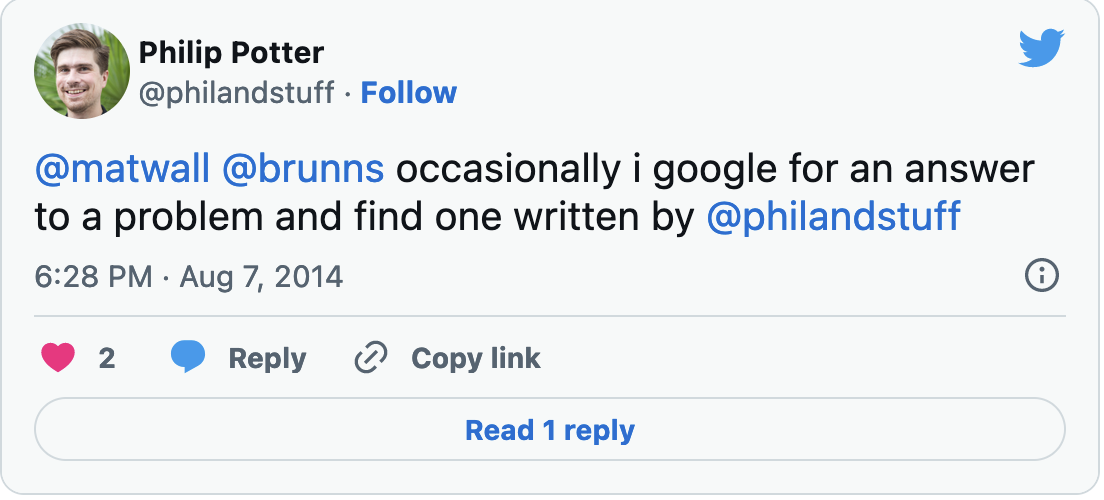How to blog
Someone recently asked my advice on blogging, particularly how I decide what to write about and whether I set aside specific time. Here’s what I said.
Share what you learn
This is my guiding principle, for blogging and otherwise. Anything you’ve learned is worth writing up, as someone else will then be able to learn it too. Writing it up also helps make sure you really understand it yourself.
Write about things you are asked about
If someone asks you for information, or you find yourself sharing the same information with different people, that could be worth writing a post about.
One of my most popular posts was one which mainly just links to other resources. I recently discovered that it had even been linked to in the call for papers for Web Directions Australia. It was basically the blog post form of an email I’d sent several times, trying to persuade people to submit to a conference.
Write about things you want to remember
I don’t have a very good memory, and one of the strategies I use for remembering things is to write them up. I have often referred back to posts I have written myself, for example on regex, on setting up a local wifi and on Git.
This helps build up a body of work, and also helps you to be less perfectionist about what you post. And it’s also very useful when you want to refresh your memory!

Write about things people ask you to write about
Sometimes people suggest you write a post about something you’ve explained to them or discussed with them, as the excellent Martin Jackson did for my post on how to raise good pull requests. I’m really glad he made that suggestion as I’ve seen that shared several times since (often in PRs).
If someone suggests you write a blog post about something that’s always a good hint as it means you’ll have at least one reader!
Don’t be perfectionist
Before I started blogging, I worried for quite some time about what I would say, how I would know to write about, or whether it would be interesting. In the end I decided to just go for it (hence the name of my blog).
My early posts are really very boring; they were just details of me getting to grips with Unix. I doubt anyone read them. But it got me started, and it got me into the habit of writing things up and speaking into the void.
The more you write boring posts, the more you think of how things can be interesting. Don’t wait for ideas to be good enough.
You could try being disciplined about a schedule
Having a set schedule can help. For example, the excellent Cate Huston posts every Monday, Wednesday, Friday and Sunday. She points out that this means you get better with practice, and also, treating the schedule as more important than the content avoids you making the wrong decision about what will be interesting to other people. (That whole post is useful advice on how to maintain side projects.)
The inspiring Mark Needham started his blog by committing to write a blog post every day about one thing he’d learned. He didn’t manage it every day, but over seven years he has managed more than one every other day.
Write the post when you get the idea
However, I don’t have a schedule. My aim is just to keep my site roughly up to date, which for me means I start to feel anxious if I’ve not posted in the past three months. I usually try and write posts when the idea strikes me and if I’ve been writing a lot, I might park it to post later.
For example, I wrote the first draft of this in August 2015, but I had just posted on the GDS Technology blog and I knew I had two more GDS blog posts coming soon, so I parked this one.
Writing a draft of it then was very easy, as I’d just had the conversation offering advice so it was all fresh in my mind, and it was easy to redraft it last night as the meat of it was all there.
Structuring your post
How to write is a whole nother post (/book) in itself but three things I bear in mind are:
- split the post using headings which can be skimmed to tell a story on their own
- try and keep the introductory paragraph as brief as possible while still telling the reader what they will find herein.
You’ll get into the habit
Once you get into the habit of blogging and figure out your own style, you start to recognise what things can be formed into a blog post as they are happening.
For example, I’ve written up discussions at conferences, advice people have given me, work I’ve done and work I plan to do. It’s not all freeform discussion of why roofing should be more like software development.
The executive summary
If I could only give you two pieces of advice, I’d say: share what you learn, and JFDI.
If you’d like to be notified when I publish a new post, and possibly receive occasional announcements, sign up to my mailing list: